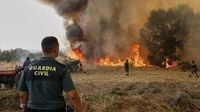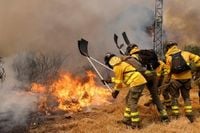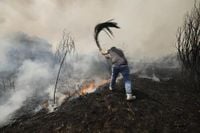As southern Europe faces the most punishing wildfire season in recent memory, Spain and Portugal are at the heart of a crisis that has claimed lives, devastated landscapes, and forced thousands from their homes. The relentless blazes, stoked by record-breaking heat and parched conditions, have prompted a massive mobilization of resources and international cooperation, highlighting the growing risks posed by climate change across the continent.
On August 16, 2025, firefighters in Veiga das Meas, northwestern Spain, battled a wildfire that was just one among many spreading rapidly through the region. By August 17 and 18, the situation had escalated dramatically: Spain was struggling to contain 20 major wildfires, with the northwestern region of Galicia particularly hard hit. There, several fires merged into a massive blaze near the city of Ourense, leading to the closure of highways and rail services and the imposition of lockdowns and evacuations for threatened homes, according to the Associated Press and Reuters.
Prime Minister Pedro Sánchez, addressing the crisis at a press conference in Ourense, announced the deployment of an additional 500 troops from the military emergency unit, bringing the total number of military personnel on wildfire duty to 1,900. “There are still some challenging days ahead and, unfortunately, the weather is not on our side,” Sánchez said, as quoted by Reuters. The scale of the response underscores the severity of the fires, which have burned 158,000 hectares—an area roughly the size of metropolitan London—according to the European Forest Fire Information System (EFFIS).
Alfonso Rueda, president of the Galician regional administration, described the perilous situation: “Homes are still under threat, so we have lockdowns in place and are carrying out evacuations.” For more than a week, Galicia has been battling the spreading flames, with residents in villages like Villardevos resorting to desperate measures—fighting fires with buckets due to power outages that rendered water pumps useless. “The fireplanes come in from all sides, but they don’t come here,” local resident Basilio Rodriguez told Reuters. Another villager, Lorea Pascual, lamented, “It’s insurmountable, it couldn’t be worse.”
The human toll has been grim. In the past week alone, fires in Spain claimed three lives, including a firefighter who died after his truck fell down a steep hill in Castile and León on August 17, 2025. Prime Minister Sánchez expressed his “sadness” and “desolation” at the loss, as reported by the BBC. Two volunteers died fighting fires in León the previous week, and another man perished in Tres Cantos near Madrid. In total, the death toll from wildfires in Spain rose to four by August 18, with five more people injured—four of them critically—in Castile and León. Neighboring Portugal also mourned the death of a firefighter in a “tragic” traffic accident, President Marcelo Rebelo de Sousa confirmed.
The fires have forced the evacuation of 27,000 residents in Spain’s northwest and west, with the air in some areas described as “unbreathable” due to thick smoke. Galician authorities have advised people to wear face masks and limit outdoor exposure to avoid inhaling smoke and ash. National rail operator Renfe suspended Madrid-Galicia high-speed train services scheduled for August 17 and 18, citing the dangers posed by the fires.
Scorching heat has made the firefighting effort even more daunting. The Spanish national weather agency AEMET warned that temperatures could reach 45°C (113°F) in some regions, with Cordoba recording 44.7°C (112.46°F) on August 16. AEMET posted on X (formerly Twitter) that “wildfire danger is extreme in most of the country this Sunday, when extraordinarily high temperatures are expected.” The weather, described as “very adverse” by Virginia Barcones, director general of emergency services, is not expected to offer relief until at least Tuesday.
International assistance has become vital. Spain awaited the arrival of two Dutch water-dumping planes to join aircraft from France and Italy, already engaged under a European cooperation agreement. Firefighters from other countries are also expected to arrive in the coming days, according to Spain’s Civil Protection Agency chief Virginia Barcones. The European Civil Protection Mechanism has been activated, allowing for the rapid deployment of resources across borders.
Portugal, meanwhile, is grappling with its own wildfire emergency. More than 4,000 firefighters, 1,300 vehicles, and 17 aircraft were deployed as of mid-August, with the area burned reaching 139,000 hectares—seventeen times higher than in 2024, according to the Institute for the Conservation of Nature and Forests. Provisional data from the ICNF forestry protection institute indicated that 155,000 hectares had burned so far in 2025, three times the average for this period between 2006 and 2024. Eight large blazes were ongoing in central and northern Portugal, with the largest near Piodao, a scenic mountainous area popular with tourists. A smaller fire east of Trancoso burned for eight days and claimed a local resident’s life on August 15.
Elsewhere in southern Europe, Greece, Bulgaria, Montenegro, and Albania have also requested help from the EU’s firefighting force, which has already been activated as many times this year as in all of last year’s summer fire season. In Turkey, wildfires since late June have killed 19 people, with evacuations near the historic Gallipoli memorials as blazes threatened homes and heritage sites.
The causes of the fires are not solely natural. Since June, Spanish authorities have arrested 27 people and investigated 92 more for suspected arson. The Civil Guard announced sanctions against four individuals for unauthorized burns in A Coruña, Galicia. Causing a wildfire is a criminal offense in Spain, even if accidental.
According to scientists cited by the EU’s Copernicus Climate Change Service and Spain’s state meteorological agency, climate change is exacerbating the frequency and intensity of heat waves and dry spells, making southern Europe more vulnerable to wildfires. Europe has warmed twice as fast as the global average since the 1980s, a trend that is only increasing the region’s susceptibility to such disasters.
As the fires continue to rage, the resilience of local communities and the dedication of emergency responders are being tested like never before. With more challenging days ahead, the battle against the flames is as much a fight for the future as it is for the present.



